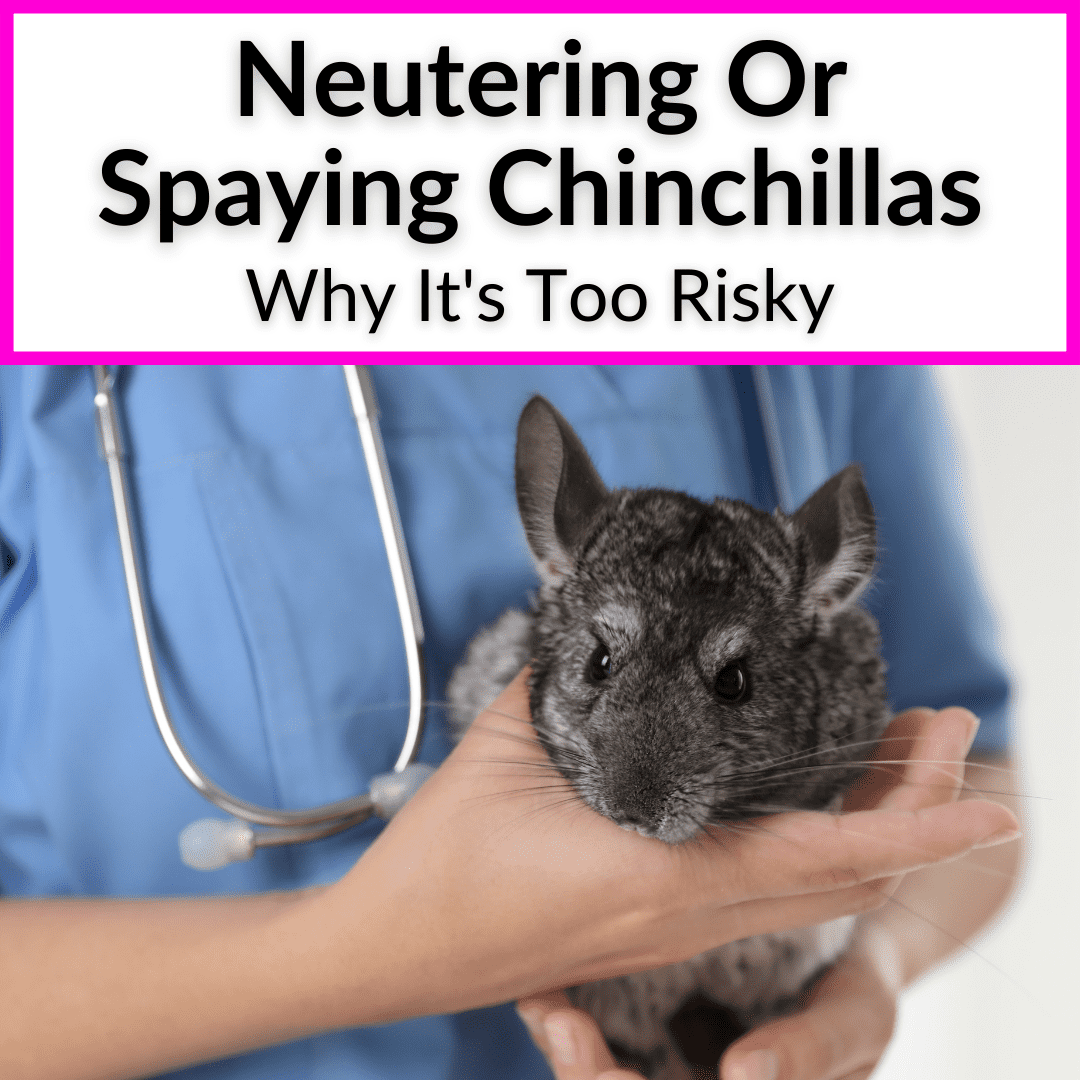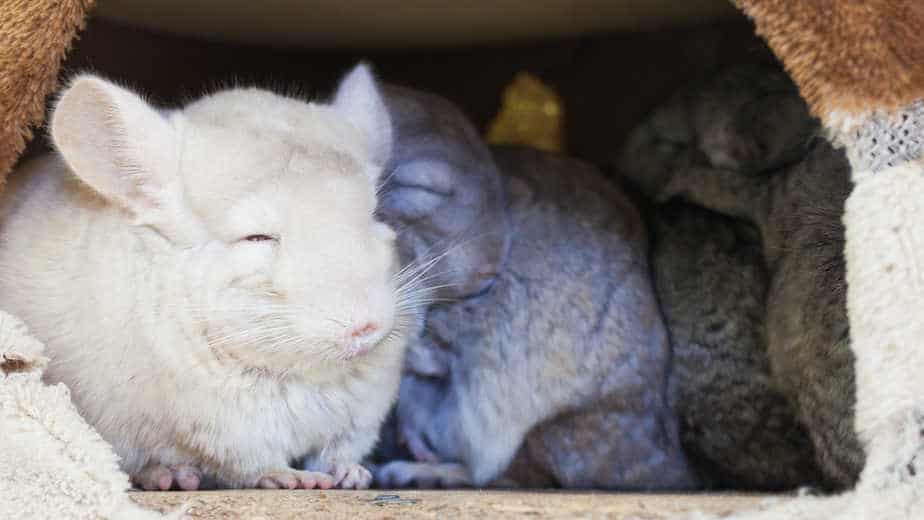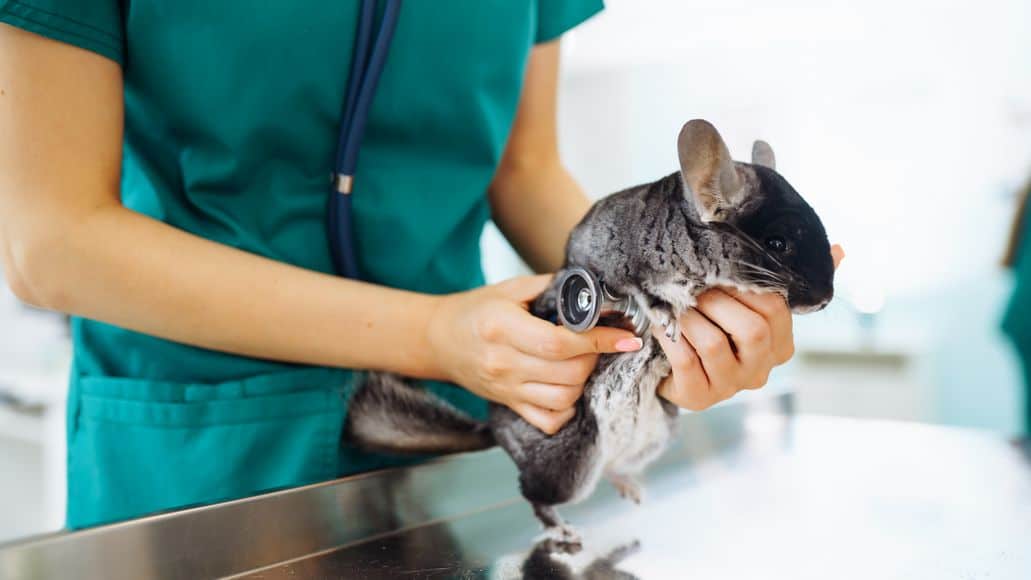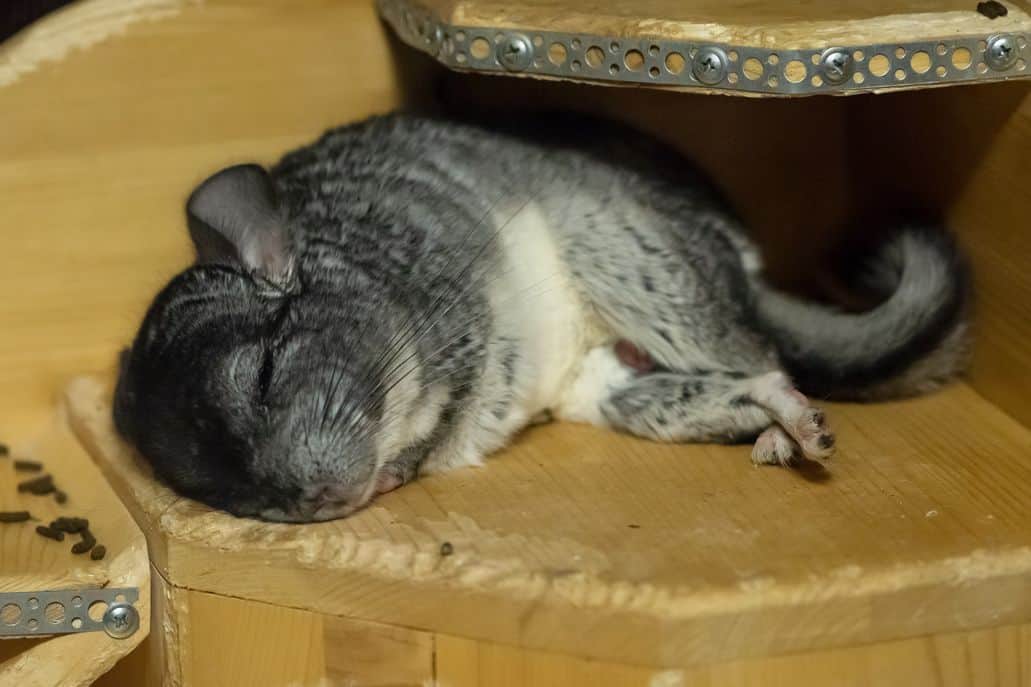
That way they each have a companion to keep them company.
And the best combination to ensure harmony in the cage is a male and a female, not two chinchillas of the same sex.
But that brings with it one obvious problem.
Housing a male and female together will result in pregnancy and babies.
To avoid that, you’ll need to neuter your male or spay your female. But sterilization procedures come with serious risks.
Keep reading to learn what those risks are and why we generally recommend against spaying or neutering, in lieu of simply separating the two chinchillas.
Contents
Spaying Or Neutering Chinchillas: Should You Do It?
Chinchillas do not need to be neutered or spayed. The standard advice is to not have either procedure performed.
If you don’t intend on breeding and don’t want to have chinchillas reproduce, a better solution is to simply not house female and male chinchillas together. Female chinchillas should only be spayed if a medical emergency arises during pregnancy.
That said, don’t place such a significant weight on this answer that you take it as gospel. I don’t want to give the impression that spaying or neutering a chinchilla isn’t possible or that you should never do it.
That simply isn’t the case.
If you are reading this, it is likely you are considering housing a male and female chinchilla together, but you don’t want to end up with a bunch of baby chinchillas.

It’s good you’re doing research, because if you do decide to house a male and female chinchilla together, the chances are very high that you will have some new baby chinchillas on your hands.
If you do insist on housing a male and female together, neutering the male is almost always the better course of action. Experts see spaying a female chinchilla as more dangerous than necessary.
If you do have the desire to handle the situation with one of your chinchillas, it will likely be your male chinchilla that ends up going under the knife.
So let’s go ahead and cover the pros and cons of this procedure.
Pros And Cons Of Neutering Or Spaying A Chinchilla
Before making any drastic decisions about spaying or neutering a chinchilla, it’s essential to understand what best practices to follow and when these procedures are typically advised.
In nearly all scenarios, we would not recommend fixing, neutering, or spaying a chinchilla. The primary reason for this is because it’s dangerous. It’s also rarely necessary.
The big issue is with the anesthesia needed for these procedures. That’s what carries the most health risk for a chinchilla.
Especially since chinchillas naturally get scared easily, and anesthesia under stress is always a risk with an animal this small.
In all honesty, the pros are minimal when it comes to this procedure.
When a qualified exotic vet does recommend this procedure, it’s typically due to an emergency. Usually it’s a case of a female chinchilla having complications while giving birth to a litter of kits, making an emergency c-section necessary.
It’s also possible that your vet could recommend this procedure for a female, if excess bleeding occurs during the giving birth process.

With males, it’s not as dangerous. But vets still generally recommended against neutering a male chinchilla.
As stated previously, the only time it makes sense to consider neutering a male chinchilla is if you have a reason not to separate a male and female chinchilla. for example, perhaps they have been bonded together for a long time and you don’t want to break that up.
Again, in most situations, the recommendation is to simply separate the chinchillas, instead of having one of these procedures done.
Always Consult An Experienced Exotic Vet
Before you consider neutering or spaying your chinchilla, make sure you speak to an experienced exotic animal vet with experience working with chinchillas specifically.
Call around and ask questions to local vets until you have a comfortable and reassuring feeling about the procedure and have established a sense of trust with the vet.
Inquire how often they have performed the procedure in the past and also inquire about the methods they use post-surgery.
This can include questions like whether they use glue or stitches to heal the wound, how many days of recovery are needed, and if any medication will be needed post-operation.
Typically glue is the best way to close the wound, so that your chinchilla won’t bother the wounded area. Chinchillas typically won’t mess with the glue, but they will attempt to pick and chew at stitches.
Ask as many questions as possible and consider alternatives if feasible. Once you are comfortable, you need to understand what to expect. Here are those details for you.
What to Expect If You Neuter Or Spay Your Chinchilla

Okay, let’s move on and assume that, for whatever reason, you need to sterilize your chinchilla.
What can you expect?
What do you need to do?
For starters, a big recommendation I have is to ensure that you keep your chinchilla’s stress level as low as possible before the procedure.
You will want to choose a vet office that’s not too loud and not too far to travel to.
Again, refer to my previous statements about ensuring you ask plenty of questions to your vet to make sure that you are comfortable with the vet and the procedure in general.
Also, realize that some recovery time will be necessary after the operation. That said, it often only takes a few hours after the surgery for your chinchilla to be up and moving around again.
It’s important to remain with the vet or at the vet office until your chinchilla can stand and move normally, and is eating or drinking water.
When you arrive home, you will want to keep an eye on your chinchilla and ensuring the recovery and healing process is going accordingly according to your vet’s instructions.
You also want to ensure that you provide any medications instructed by your vet to help control any pain that your chinchilla may be experiencing.
Neutering Chinchillas: Final Thoughts
At the end of the day, you don’t need to consider neutering or spaying your chinchilla, unless a medical emergency arises with your female chinchilla during childbirth, or you have a male and female you simply don’t want to separate.
If you’re not sure what gender your pet is, read about sexing a chinchilla.
These are beautiful pets to own with unique characteristics.
They make for great pets, but they don’t come without some delicate issues and considerations.
If your chinchilla needs to undergo one of these procedures, be sure to do your homework and research about the exotic vet you are going to choose to work with for the procedure.
Outside of medical emergencies, I highly recommend other avenues instead of neutering or spaying, such as simply separating the two chinchillas.
It’s a dangerous procedure for such a small rodent and you need to take that danger seriously before making any decisions.
I wish you the best of luck, and I wish all your chinchillas a speedy recovery.
What’s your experience with neutering or spaying a chinchilla?
Do you have anything you can add to this post to help the readers?
Did I leave anything out that you feel pertinent for other chinchilla owners to understand?
Be sure to share these thoughts, comments, and concerns by dropping a comment below.
As always, Chili and I appreciate you stopping by and reading. Thanks again, and we will see you next time.
Leave a Reply